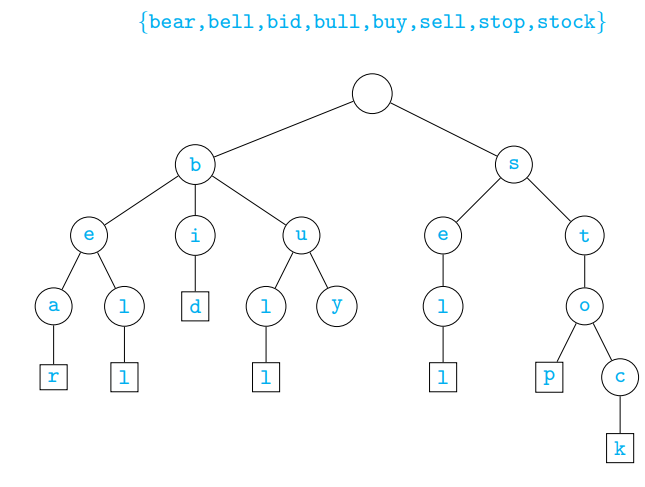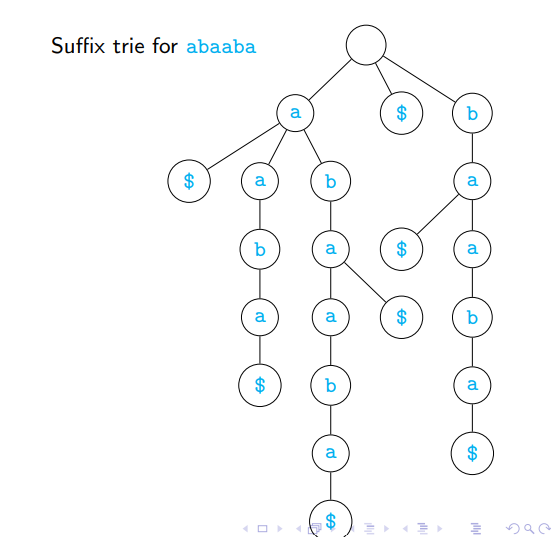
Home Week-9
PDSA - Week 12 (As Extra Content)
PDSA - Week 12 (As Extra Content)String matchingBrute force approachBoyer-Moore AlgorithmRabin-Karp AlgorithmKnuth-Morris-Pratt algorithmTriesRegular expression
String matching
Searching for a pattern is a fundamental problem when dealing with text
Editing a document
Answering an internet search query
Looking for a match in a gene sequence
Example
anoccurs inbananaat two positions
Formally
A text string
tof lengthnA pattern stringpof lengthmBoth
tandpare drawn from an alphabet of valid letters, denotedΣFind every position
iin t such thatt[i:i+m] == p
Brute force approach
Nested scan from left to right in t
1def stringmatch(t,p):2 poslist = []3 for i in range(len(t)-len(p)+1):4 matched = True5 j = 06 while j < len(p) and matched:7 if t[i+j] != p[j]:8 matched = False9 j = j+110 if matched:11 poslist.append(i)12 return(poslist)13print(stringmatch('abababbababbbbababab','abab'))Output
xxxxxxxxxx11[0, 2, 7, 14, 16]Complexity
Nested scan from right to left
xxxxxxxxxx131def stringmatchrev(t,p):2 poslist = []3 for i in range(len(t)-len(p)+1):4 matched = True5 j = len(p)-16 while j >= 0 and matched:7 if t[i+j] != p[j]:8 matched = False9 j = j-110 if matched:11 poslist.append(i)12 return(poslist)13print(stringmatchrev('abababbababbbbababab','abab'))Output
xxxxxxxxxx11[0, 2, 7, 14, 16]
Complexity
Speeding up the brute force algorithm
Text
t, patternpof of lengthsn,mFor each starting position
iint, comparet[i:i+m]withpScan
t[i:i+m]right to left
While matching, we find a letter in
tthat does not appear inpt = bananamania,p = bulk
Shift the next scan to position after mismatched letter
What if the mismatched letter does appear in
p?
Boyer-Moore Algorithm
Algorithm
Initialize
last[c]for eachcinpSingle scan, rightmost value is recorded
Nested loop, compare each segment
t[i:i+len(p)]withpIf
pmatches, record and shift by1We find a mismatch at
t[i+j]If
j > last[t[i+j]], shift byj - last[t[i+j]]If
last[t[i+j]] > j, shift by1Should not shift
pto left!
If
t[i+j]not inp, shift byj+1
Implementation
xxxxxxxxxx231def boyermoore(t,p):2 last = {} # Preprocess3 for i in range(len(p)):4 last[p[i]] = i5 poslist=[]6 i = 07 while i <= (len(t)-len(p)):8 matched,j = True,len(p)-19 while j >= 0 and matched:10 if t[i+j] != p[j]:11 matched = False12 j = j - 113 if matched:14 poslist.append(i)15 i = i + 116 else:17 j = j + 118 if t[i+j] in last.keys():19 i = i + max(j-last[t[i+j]],1)20 else:21 i = i + j + 122 return(poslist)23print(boyermoore('abcaaacabc','abc'))Output
xxxxxxxxxx11[0, 7]
Complexity
Worst case remains
If t = aaa...a, p = baaa
Rabin-Karp Algorithm
Suppose Σ = {0, 1, . . . , 9}
Any string over Σ can be thought of as a number in base 10
Pattern
Each substring of length
Scan
Implementation
xxxxxxxxxx151def rabinkarp(t,p):2 poslist = []3 numt,nump = 0,04 for i in range(len(p)):5 numt = 10*numt + int(t[i])6 nump = 10*nump + int(p[i])7 if numt == nump:8 poslist.append(0)9 for i in range(1,len(t)-len(p)+1):10 numt = numt - int(t[i-1])*(10**(len(p)-1))11 numt = 10*numt + int(t[i+len(p)-1])12 if numt == nump:13 poslist.append(i)14 return(poslist)15print(rabinkarp('233323233454323','23'))Output
xxxxxxxxxx11[0, 4, 6, 13]
Analysis
Preprocessing time is
To convert
t[0:m],pto numbers
Worst case for general alphabets is
Every block
t[i:i+m]may have same remainder moduloqas the patternpMust validate each block explicitly, like brute force
In practice number of spurious matches will be small
If |Σ| is small enough to not require modulo arithmetic, overall time is
Also if we can choose
qcarefully to ensure
Rabin Karp Implementation for strings
xxxxxxxxxx311def rabin_karp(text, pattern):2 match_found =[]3 n = len(text)4 m = len(pattern) 5 # Prime number to use for the hash function6 prime = 101 7 # Calculate the hash value of the pattern8 pattern_hash = 09 for i in range(m):10 pattern_hash += ord(pattern[i])11 pattern_hash = pattern_hash % prime12 13 # Calculate the hash value of the first substring of the text14 text_hash = 015 for i in range(m):16 text_hash += ord(text[i])17 text_hash = text_hash % prime18 # Iterate through the text, checking for matches with the pattern19 for i in range(n - m + 1):20 # Check if the current substring matches the pattern21 if text_hash == pattern_hash and text[i:i+m] == pattern:22 match_found.append(i) 23 # Calculate the hash value of the next substring24 if i < n - m:25 text_hash = (text_hash - ord(text[i]) + ord(text[i+m]))26 text_hash = text_hash % prime27 # No match found28 return match_found29text = 'abcdbabcdb'30pattern = 'abcdb'31print(rabin_karp(text, pattern))Output
xxxxxxxxxx11[0, 5]
Knuth-Morris-Pratt algorithm
Compute the automaton for
pefficientlyMatch
pagainst itselfmatch[j] = kif suffix ofp[:j+1]matches prefixp[:k]
Suppose suffix of
p[:j+1]matches prefixp[:k]If
p[j+1]==p[k], extend the matchOtherwise try to find a shorter prefix that can be extended by
p[j+1]
Usually refer to match as failure function fail
Where to fall back if match fails
Computing the fail function
Initialize
fail[j] = 0for alljkkeeps track of length of current matchjis next position to update failIf
p[j] == p[k]extend the match, setfail[j] = k+1If
p[j] != p[k]find a shorter prefix that matches suffix ofp[:j]Step back to
fail[k-1]
If we don’t find a nontrivial prefix to extend, retain
fail[j] = 0, move to next position
Implementation of fail function
xxxxxxxxxx141def kmp_fail(p):2 m = len(p)3 fail = [0 for i in range(m)]4 j,k = 1,05 while j < m:6 if p[j] == p[k]:7 fail[j] = k+18 j,k = j+1,k+19 elif k > 0:10 k = fail[k-1]11 else:12 j = j+113 return(fail)14print(kmp_fail('abcaabca'))Output
xxxxxxxxxx11[0, 0, 0, 1, 1, 2, 3, 4]
Complexity
Implementation of KMP algorithm
Scan
tfrom beginningjis next position intkis currently matched position inpIf
t[j] == p[k]extend the matchIf
t[j] != p[k], update match prefixIf we reach the end of the while loop, no match
x1def kmp_fail(p):2 m = len(p)3 fail = [0 for i in range(m)]4 j,k = 1,05 while j < m:6 if p[j] == p[k]:7 fail[j] = k+18 j,k = j+1,k+19 elif k > 0:10 k = fail[k-1]11 else:12 j = j+113 return(fail)14
15def find_kmp(t, p):16 match =[]17 n,m = len(t),len(p)18 if m == 0:19 match.append(0)20 fail = kmp_fail(p)21 j = 022 k = 023 while j < n:24 if t[j] == p[k]:25 if k == m - 1:26 match.append(j - m + 1)27 k = 028 j = j - m + 229 else:30 j,k = j+1,k+131 elif k > 0:32 k = fail[k-1]33 else:34 j = j+135 return(match)36print(find_kmp('ababaabbaba','aba'))Output
xxxxxxxxxx11[0, 2, 8]Analysis
The Knuth, Morris, Pratt algorithm efficiently computes the automaton describing prefix matches in the pattern
pComplexity of preprocessing the fail function is
After preprocessing, can check matches in the text t in
Overall, KMP algorithm works in time
Tries
A trie is a special kind of tree
From “information retrieval”
Pronounced try, distinguish from tree
Rooted tree
Other than root, each node labelled by a letter from Σ
Children of a node have distinct labels
Each maximal path is a word
One word should not be a prefix of another
Add special end of word symbol
$

Build a trie
Tfrom a set of wordsSwithswords andntotal symbolsTo search for a word
w, follow its pathIf the node we reach has
$as a successor representwis a prefix of some
Build a trie
Tfrom a set of wordsSwithswords andntotal symbolsBasic properties for T built from S
Height of
TisA node has at most |Σ| children
The number of leaves in
TissThe number of nodes in
Tisn + 1, plus s nodes labelled$
Implementation of Tries
xxxxxxxxxx311class Trie:2 def __init__(self,S=[]):3 self.root = {}4 for s in S:5 self.add(s)6 def add(self,s):7 curr = self.root8 s = s + "$"9 for c in s:10 if c not in curr.keys():11 curr[c] = {}12 curr = curr[c]13 def query(self,s):14 curr = self.root15 for c in s:16 if c not in curr.keys():17 return(False)18 curr = curr[c]19 if "$" in curr.keys():20 return(True)21 else:22 return(False)23 24T = Trie()25T.add('car')26T.add('card')27T.add('care')28T.add('dog')29T.add('done')30print(T.query('dog'))31print(T.query('cat'))Output
xxxxxxxxxx21True2False
Analysis
Tries are useful to preprocess fixed text for multiple searches
Searching for
pis proportional to length ofpMain drawback of a trie is size
Suffix Tries
Expand
Sto include all suffixesFor simplicity, assume
S = {s}suffix(S) = {w | ∃v, vw = s}
Build a trie for
suffix(S)Use
$to mark end of wordSuffix trie for
S
Using a suffix trie we can answer the following
Is
wa substring ofs?How many times does
woccur as a substring ins?What is the longest repeated substring in
s?

Implementation of suffix tries
xxxxxxxxxx241class SuffixTrie:2 def __init__(self,s):3 self.root = {}4 s = s + "$"5 for i in range(len(s)):6 curr = self.root7 for c in s[i:]:8 if c not in curr.keys():9 curr[c] = {}10 curr = curr[c]11 def followPath(self,s):12 curr = self.root13 for c in s:14 if c not in curr.keys():15 return(None)16 curr = curr[c]17 return(curr)18 def hasSuffix(self,s):19 node = self.followPath(s)20 return(node is not None and "$" in node.keys())21ST = SuffixTrie('card')22print(ST.root)23print(ST.followPath('a'))24print(ST.hasSuffix('aa'))Output
xxxxxxxxxx21{'r': {'d': {'$': {}}}}2False
Regular expression
use lecture's slides